Graphic eyewitness Somme accounts revealed
- Published
Sean Coughlan reports for Radio 4's PM on the first-hand accounts of the Somme
"From that moment all my religion died, after that journey all my teaching and belief in God had left me - never to return."
This was how Charles Bartram, a 23-year-old former colliery worker from Doncaster, described his experience of the first day of the Battle of the Somme in 1916.
It is one of more than 500 remarkable first-hand accounts of the World War One battle donated to the Imperial War Museum, the "vast majority" of which have never been seen before.
Anthony Richards, head of documents and sound at the museum, says it is "quite amazing" to have come across so much previously unseen material about a battle that ended 100 years ago this week.
George Ward describes how his grandfather would not talk about his Somme experiences
What makes these testimonies "incredibly unusual" he says, is that they talk so candidly about killing in hand-to-hand fighting - and often the remorse felt afterwards.
"It's very unusual for people from World War One to talk about the actual act of killing. It's usually skirted around."
It was an "uncomfortable" subject for returning soldiers, he says, and memoirs and letters tended to avoid it.
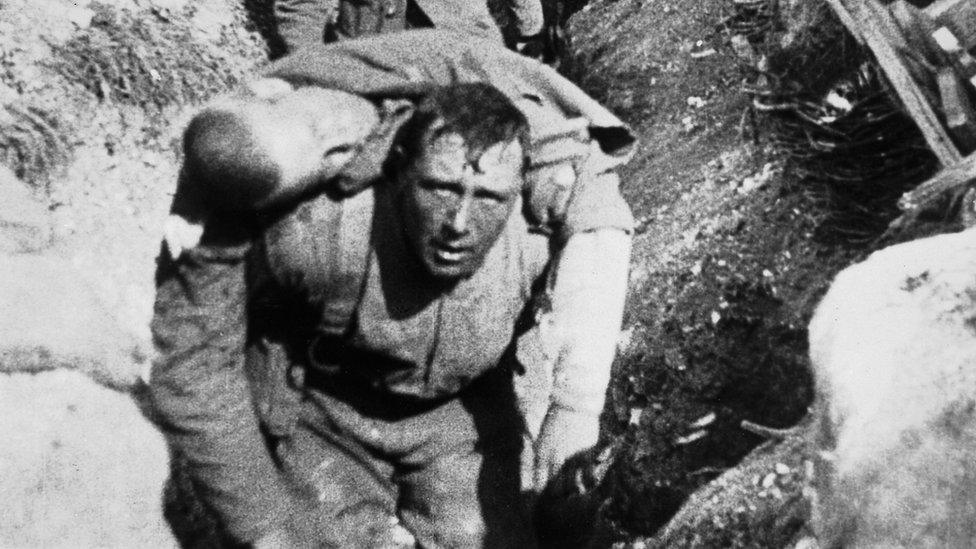
There were more than one million casualties in the battle, which ran from July until November 1916
But these accounts have some graphic details.
John Kirkham of the Manchester Battalion described how he could not shake off the memory of striking a German soldier with a club with metal spikes.
"It sank deep into his forehead. In the scuffle, his helmet flew off, and I saw that he was a bald-headed old man. I have never forgotten that bald head, and I don't suppose I ever will, poor devil."
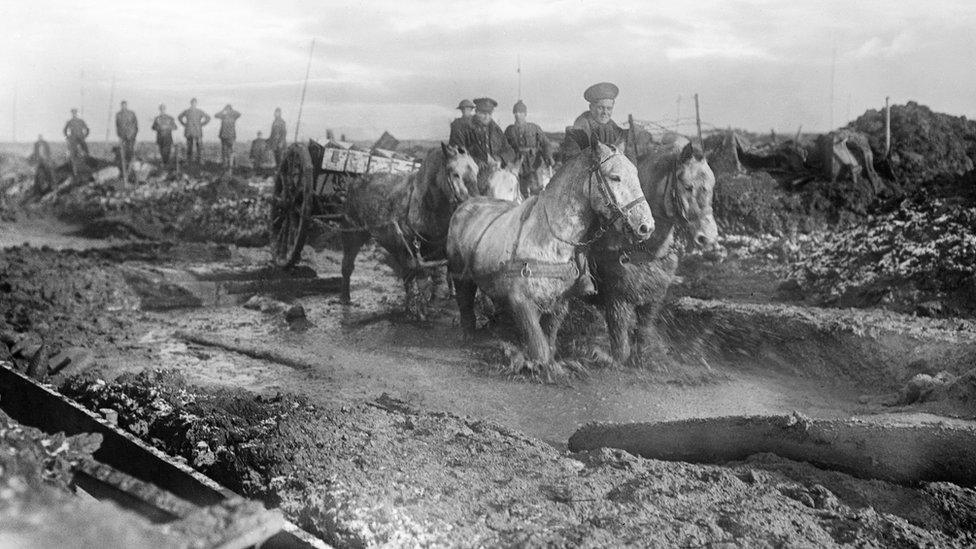
Horses drag ammunition through the mud during the Somme offensive in November 1916
The accounts were gathered more than 40 years ago for a classic history of the Somme, written by Martin Middlebrook. But much of the material was never published and only this summer was given to the museum.
This might have been the only time that soldiers recorded their feelings.
"You ask me to tell you about things I saw, you will be the only person I have ever told this to. The reason, they would never believe me," recorded Robert Payne of the Royal Garrison Artillery.
This soldier won the Military Medal, but his account includes stories of "self-inflicted wounds, several cases of madness" and a "poor chap" who threw down his gun and refused to move.
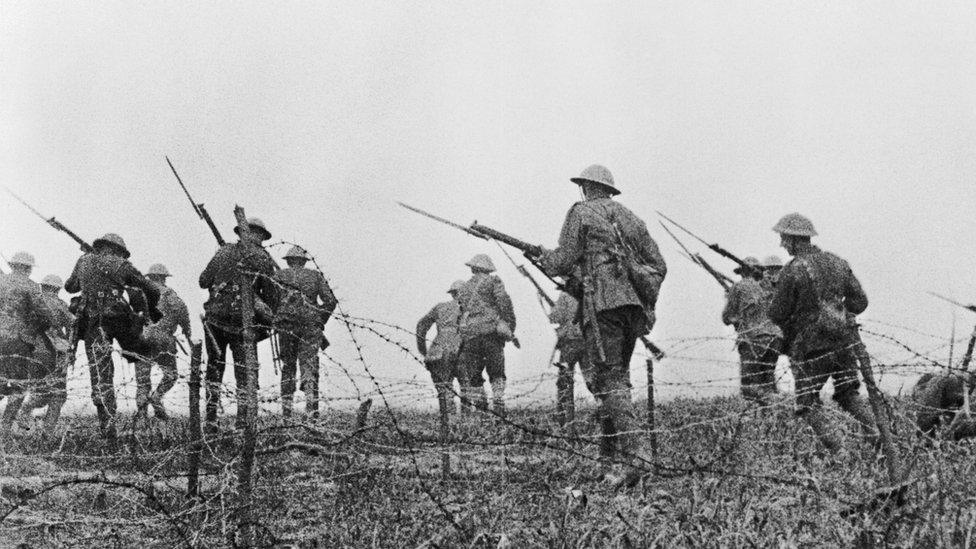
This photograph of troops advancing on the Somme is now thought to have been staged behind the lines
There are other accounts of an officer with shellshock having to be physically restrained by his "burly batman".
Despite the violence of the conflict, these stories are deeply humane and lacking in any self-glorification.


George Mayne, a 19-year-old Royal Fusilier describes a sense of "bewilderment" and feeling "woolly-headed" as he went over the top and charged across no man's land.
When he stormed into the opposing trench he found a dying German soldier, calling for his mother and for water.
"I am glad to this day that I gave him a drink from my precious water," he wrote.
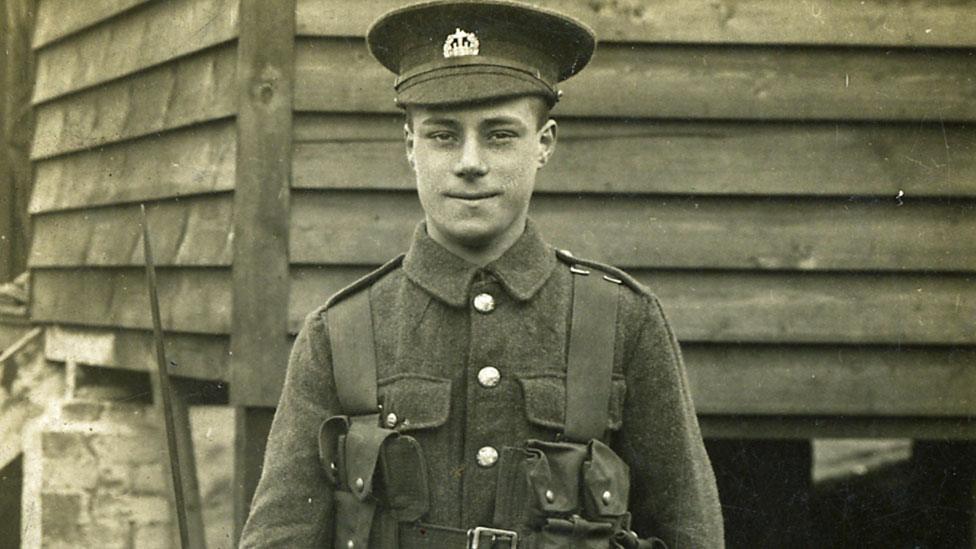
George Rudge had given a false age and had been only 17 when he fought at the Somme
There were moments of bleak humour too.
Tom Short, a 19-year-old with the London Rifle Brigade, had charged a trench spotted by aerial reconnaissance, to find that the "trench" was only two feet deep.
Horribly exposed, Tom faced a German bayonet charge and thought that it was all over.
"In a split second before the moment of connecting my stomach with a bayonet, at which I was nearly passed out in terror, a terrific shout of "halt" came from somewhere and knowing how disciplined the German soldier is, the bod coming at me slid flat on his back, his rifle shot straight up in the air and his legs shot between mine. It appears a German officer gave this order."
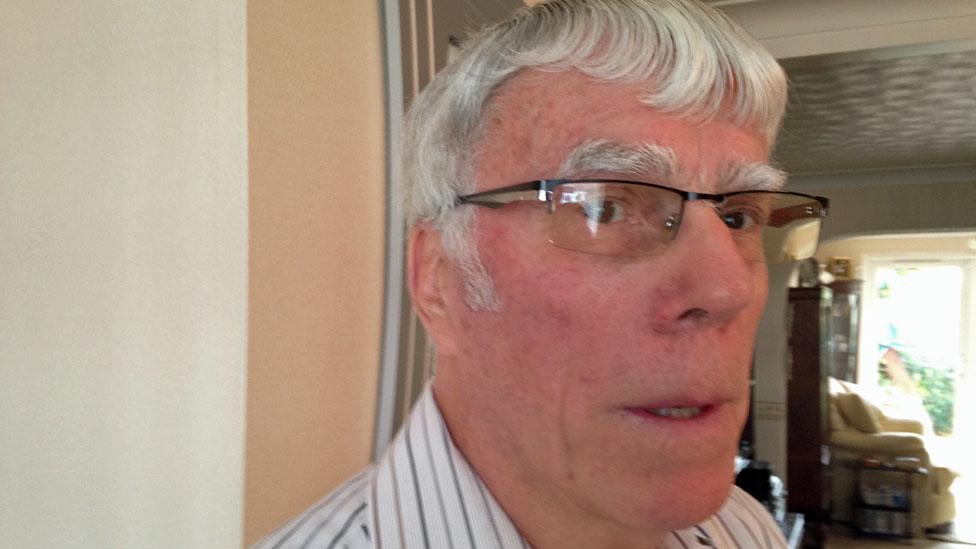
George Ward says his grandfather George Rudge never wanted to talk about the Somme
These were young men - and some were younger than they should have been.
George Rudge was only 17 at the Battle of the Somme and had given a false age when he enlisted.
"It seemed to me that everyone around me had been killed or wounded for I was the only one of my regiment I could see," he wrote, describing the advance.
He recalled his feelings about shooting the enemy.
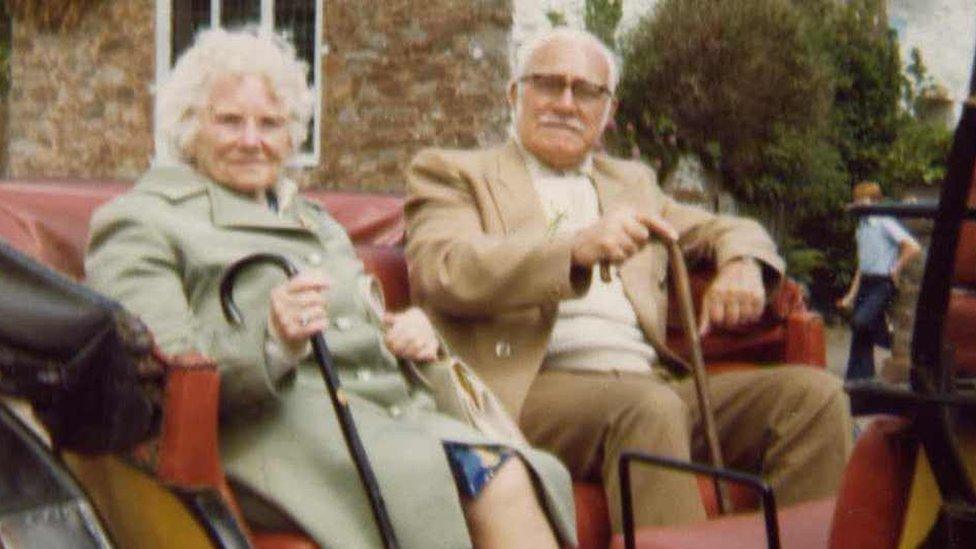
George Rudge in later life: His family have been able to read his account of fighting on the Somme
"This was the first time I had killed anybody, as far as I know, and when things quieted I went and looked at a German I knew I had shot, and I remember thinking that he looked old enough to have a family and I felt very sorry."
He was in no doubt "we were just meant to be sacrificed, as we ran into a wall of steel" and talks of advancing with a "chap who had the bottom of his jaw blown off and still kept going forward till he dropped".
None of this was known to the soldier's own family.
His grandson, George Ward, who lives in St Ives in Cambridgeshire, says they knew their grandfather had fought in World War One, but not that he had served on the first day of the Somme.
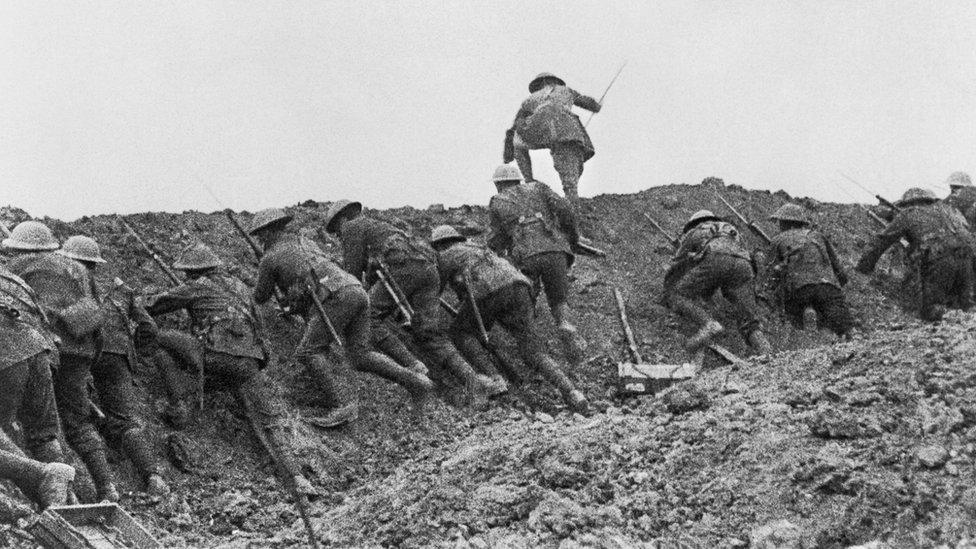
The accounts describe what it was like to go over the top at the Somme
"He was very private when it came to that," said Mr Ward.
"All he said was: 'I was in a battle… change the subject.' He wouldn't talk about it."
"It was just too horrific to talk about. They just tried to forget it. But it was there in their mind all the time."
Mr Ward says his grandfather's health suffered after the war from being gassed and he also had a breakdown.
Looking for the first time at his grandfather's account, he says "it's very emotional".
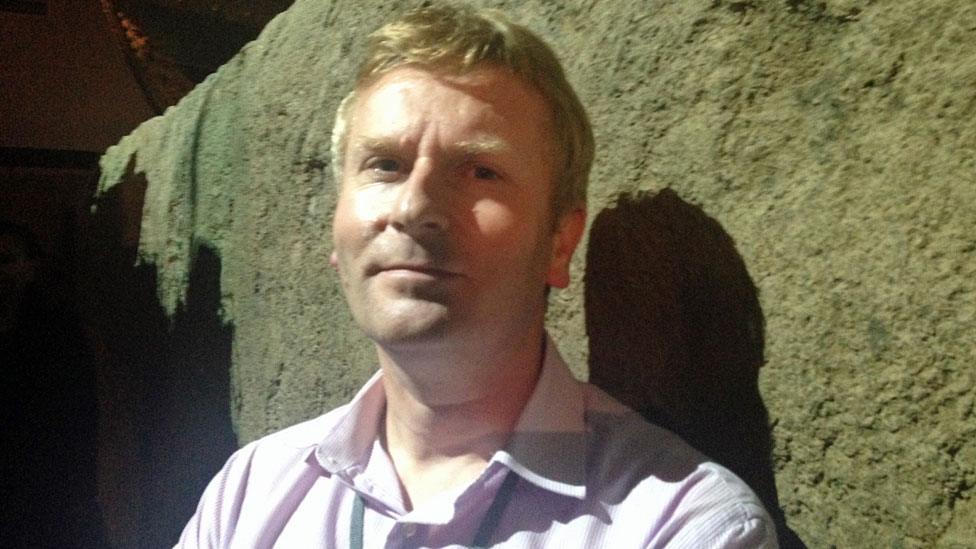
Anthony Richards, in the Imperial War Museum's recreated trench, says it is "amazing" to find so much original material about the Somme
It's difficult not to be struck by the immense courage of these youngsters. Frank Graves describes the machine-guns and watching lines of men being "cut down like grass from a scythe".
But there was compassion for those overcome by fear.
John Kirkham, who had had his arm shattered by a bullet and returned to his own lines, reported seeing "two unfortunate boys" who had been "terrified" and who he was convinced had been summarily shot for cowardice.
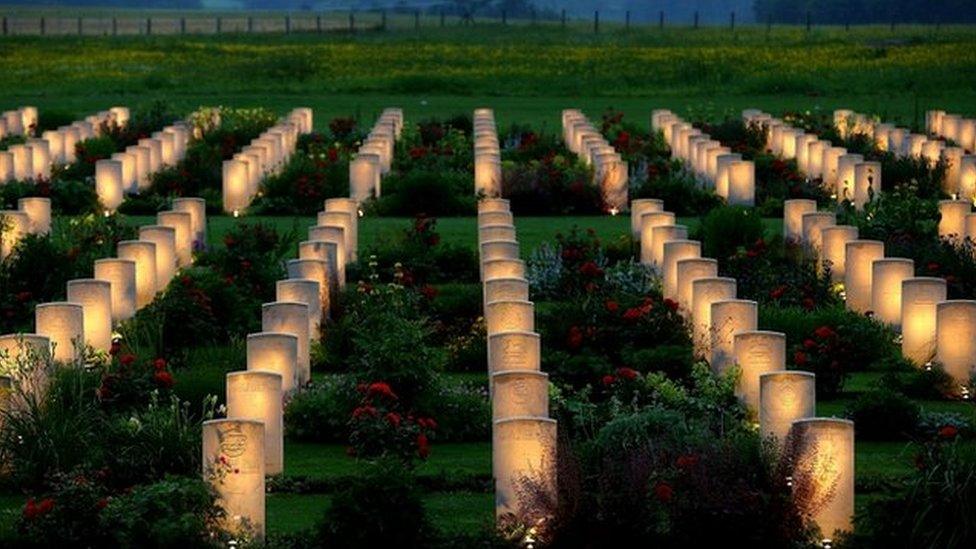
Graves were lit up to mark this year's centenary of the Somme
It was also physically and mentally exhausting.
Reginald Moore of the Northamptonshire Regiment, who had gone over the top at 07:30 and had been engaged in the battle all day, describes how it "caught up with me" when night fell.
"I started to shake and tremble and they had to put another fellow with me until I was calm again.
"That sir was 1 July, I was 18 years."

Do you have any family memories of the Somme? The Imperial War Museum wants to find out more about some of these soldiers so they can add to their www.livesofthefirstworldwar.org archives. You can carry on the conversation at https://www.facebook.com/BBCFamilyNews
Anthony RIchards is author of In Their Own Words: Untold Stories of the First World War and The Somme: A Visual History.